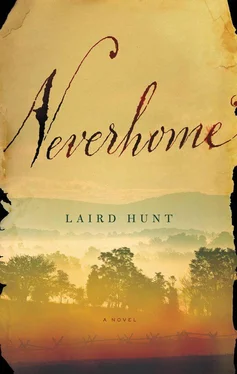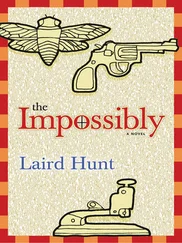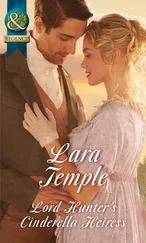Whether it does or it doesn’t, we also had minstrel shows for our entertainment or actual Negroes free from bondage to dance for us or sing. There was a giant contraband they said had come up out of Tuscaloosa on an earless donkey did his song for us on a platform he had balanced on the top of a fence post. When the song was done he bowed then flipped off that platform backward and onto the ground. He did this so well the boys had him do it again. The third time, when the crowd had swelled up to almost half the regiment, he landed bad off his jump and broke his leg.
It wasn’t just contraband could offer up marvels. A Mexican boy worked in the kitchen tents could play the banjo so fast his hand would vanish clear off the strings, and there was plenty said in hushed voices when it came to picking, it was only the devil on his good day had him beat. Some afternoons the officers would get up contests. The whiskey would go around on those days and the boys would run races or fight each other with their bare fists or play a kind of baseball involved old apples we didn’t yet know we’d want later or climb up greased poles.
The camp was about as far away as you could gallop in a day from what you would have called a pretty place. There was torn-up pasture fields around us and half the woods cut down for timber and firewood. There was a stink out of a old storybook doing its dance on any breeze might come our way. Men blowing along their own ugly breezes went every which direction, some on horse though most on foot, and there was a little line of cannon they would fire off every now and again when there wasn’t enough smoke and devil smell around to suit them. The tents were dark places, for all that the men would lay down floors and hang up likenesses and sundries from home. Sometimes there were women in the camp. But whether they were officers’ wives or pot scrubbers or ladies had long ago lost their virtue, I kept clear of them.
When I’d eaten up my given share of a day I’d take up my pen to write Bartholomew. I had never written him or anyone else a letter before those days in my life and I did not much like the look of what I found I had to say. I have improved some at writing since, as you can be the judge, but I was slow at my writing back then and using my pen to make words that would still mean something after traveling so many miles seemed a strange chore. I would read through my letters before I posted them off and it seemed like I was reading the letters of a stranger to a stranger and I did not like the way this made me feel.
My Dear Bartholomew,
Dearest Bartholomew,
Bartholomew, My Handsome Friend,
Back home it was words spoke aloud or little presents and notions we would leave for each other that had done the trick. We had a game between ourselves to be the one to see the first daffodil come up in the springtime, the first tulip, the first iris cracking open the fresh purple yolk of its bloom. Whoever saw it was to pick that first one and put it out for the other to find. That spring before I left for the fight it was Bartholomew had seen the first lilac. He tied some sprigs into a little bundle with yellow thread and set it out next to my breakfast bowl. I thought on that bright bundle more than once in my writings to see if there was any fair firsts I could signal to him, but all that came into my mind were latrines and ugly bare backs set to labor and burned coffee and mealworms popping their heads out of our hard biscuits. One day on a march I did see a blue heron spear a fish bigger than its beak out of a still puddle but when I wrote it down, the heron and the fish and the puddle came out so pale I almost struck them out.
Bartholomew’s letters to me were of another order altogether. He had a way of writing five words could bring all of the old world back to life. Reading his letters I could smell the early smells of autumn and hear the early autumn sounds. One time he put a bright red cardinal feather in the envelope and told about finding it “aflit at the edge of the well” into which it might have fallen forever had he not plucked it up and sent it to fly far across the world to find me. I cannot tell you quite why but that feather and his words about it flying far to find me put a tear into the corner of my eye wouldn’t leave even after I had wiped it away. I wasn’t the only one got my face flushed at a letter from home. Some got much worse than that. There was young boys got letters from their mothers who bawled like babies all the rest of the night. One time, I saw an old sergeant sent a pair of fresh-knit socks from his wife had to work hard to bite back the tears. A pair of fellows sitting nearby tried to tease him some but he told them if they kept it up one more minute he would stick a fork in each of their eyes.
It was that same sergeant taught us how to fix bayonets in our Springfields and stab at men made of straw and form a line and, for those that didn’t know how already, shoot. I already said earlier I knew how to shoot, and fifty yards or five hundred, it wasn’t much different in that camp. I could make my Springfield hit whatever it was they wanted me to wherever they wanted to put it and it didn’t matter if they stood behind us while we were at it and yelled in our ears or beat to breaking on a drum. There was plenty who could march or stand longer than I could or stab straw fiercer, but it was only a few could beat me with a gun.
I wrote Bartholomew about it, and in the next letter I had from him he said that was fine and I ought to be proud but that — like we had talked about — if I didn’t want the curious eyes of the entire company on me, every once in a while I needed to miss. I wrote him back that maybe it wouldn’t be so awful a thing to get noticed for what I was and sent home. He wrote that he wanted me back with him more than anything on the green good earth but that I shouldn’t come. That he knew I wasn’t ready to come home yet, that if I didn’t stay to see some of the fight I would forever be filled with the echoes of regret and the ague of remorse.
There was a fellow had his tent near ours who looked wiser than the others and I asked him after I had had this letter from Bartholomew whether he thought love ought to trump duty. “Love? What in hell is love?” said this wise-looking man and spat.

They got us what they thought was trained up enough — to where we wouldn’t stab or shoot at each other too much — and we boarded paddleboats and went down the river, then got off and marched toward the fiery South. There was battles up ahead and soon as word got around that we were moving forward to make their acquaintance, the regiment commenced to bleed off a number of its boys. It wasn’t anything at all to step away from the line and not come back. A kind of mud and mist covered our faces. We were unknown things that marched along with muskets. We might have done a thing or two back in the camp to get us noticed but now that camp was left behind. The sergeant had seen I could shoot hadn’t come along. The boys from my band had seen me at arm wrestling weren’t there. I’ll confess it to you, is all I’m saying, that I thought about leaving many was the time as we marched. Despite what Bartholomew had written me about my not being ready to come home yet. Despite all I said those days to my dead mother.
“I won’t run,” I said to her.
You will or you won’t, she said back.
“There is no storm of ice or fire can make me run,” I said to her.
You will learn whether that’s a lie one way or the other, she said back.
I was thinking about it, about leaving and putting the lie straight into my step, when we marched through one of those towns where they were all lined up to cheer and we saw a girl climbing a tree to look at us better. There must have been something sharp on one of the branches because her chemise got caught as she climbed and it tore right off. That brought a roar up out of all the boys around me, and the girl in the tree took the chemise that she wasn’t wearing any longer and waved it at us. You could see that she was sorry, even as she waved her torn garment, that she was all of her bouncing in the breeze, and before I knew what I had done I was up the tree like it was a ladder and had taken off my jacket and wrapped it around her. I wrapped it around her, pulled it snug. “There you go, miss,” I said. I said this and gave a kind of bow even up there in the tree and she looked at me, then she looked at me harder, and she saw what I was and gave a start turned her eyes from blue to green, but then another happy roar come up — this one for what I had done — from the boys below and I got down the tree and back into the line. I saw her wearing my jacket, still looking at me and pointing, but before I’d taken five or ten more breaths the company had moved on and we had left that girl behind.
Читать дальше













